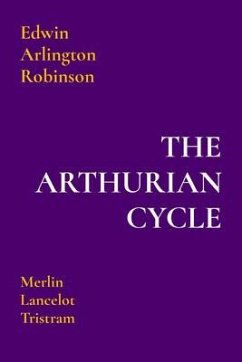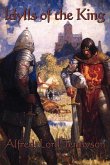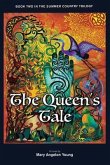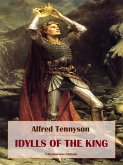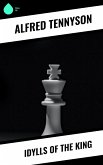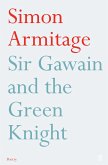The Arthurian Cycle
Merlin Lancelot Tristram
Edwin Arlington Robinson
During the era of the First World War, and in the decade thereafter, the American poet Edwin Arlington Robinson composed a cycle of epic narrative poems, written in blank verse, that were arguably modern in style but drew upon classic themes in substance. With the unfolding tragedy of a world at war top of mind, Robinson began what would become a trilogy based on the legends of King Arthur and his Knights of the Round Table.
Merlin, the first work in Robinson's Arthurian cycle, was published in 1917. Robinson's Merlin is no magician, certainly not as modern audiences have come to know him. Rather, he is a mortal man grappling with human experiences; his love for the lady Vivian and the prospect of a world going mad. Lancelot followed in 1920. At their core, Merlin and Lancelot are both war poems, with the gathering storm of the former foreshadowing the chaos and destruction of the latter, depicted in the tragic outcome of the relationship between Lancelot and Guinevere.
An interval of seven years would pass before the publication of Tristram, the third work in Robinson's trilogy. During this interval, Edwin Arlington Robinson would win the Pulitzer Prize in Poetry twice; first for his Collected Poems (published in 1921), and again for The Man Who Died Twice (published in 1924). With Tristram (published in 1927), Edwin Arlington Robinson would at last reap hard-won financial rewards for his work. Tristram also won Robinson his third Pulitzer Prize.
Edwin Arlington Robinson's Arthurian cycle reflects the poet's most mature work. With Merlin and Lancelot, Robinson recounts the human cost of war as seen through the eyes of those characters in the Arthurian legends. Robinson's Merlin, Lancelot, Guinevere, and King Arthur, as well as the supporting characters central to their portrayal, are all rendered in flesh and blood, their words and deeds rooted in the vicissitudes of mortal life. Where Merlin and Lancelot are war poems, Tristram is a poem about love. With Tristram, Robinson recounts the love story of Tristram, and his return, and of Isolt; "Isolt of the white hands, in Brittany." Theirs is a love as doomed in life as the inevitability of death.
Merlin Lancelot Tristram
Edwin Arlington Robinson
During the era of the First World War, and in the decade thereafter, the American poet Edwin Arlington Robinson composed a cycle of epic narrative poems, written in blank verse, that were arguably modern in style but drew upon classic themes in substance. With the unfolding tragedy of a world at war top of mind, Robinson began what would become a trilogy based on the legends of King Arthur and his Knights of the Round Table.
Merlin, the first work in Robinson's Arthurian cycle, was published in 1917. Robinson's Merlin is no magician, certainly not as modern audiences have come to know him. Rather, he is a mortal man grappling with human experiences; his love for the lady Vivian and the prospect of a world going mad. Lancelot followed in 1920. At their core, Merlin and Lancelot are both war poems, with the gathering storm of the former foreshadowing the chaos and destruction of the latter, depicted in the tragic outcome of the relationship between Lancelot and Guinevere.
An interval of seven years would pass before the publication of Tristram, the third work in Robinson's trilogy. During this interval, Edwin Arlington Robinson would win the Pulitzer Prize in Poetry twice; first for his Collected Poems (published in 1921), and again for The Man Who Died Twice (published in 1924). With Tristram (published in 1927), Edwin Arlington Robinson would at last reap hard-won financial rewards for his work. Tristram also won Robinson his third Pulitzer Prize.
Edwin Arlington Robinson's Arthurian cycle reflects the poet's most mature work. With Merlin and Lancelot, Robinson recounts the human cost of war as seen through the eyes of those characters in the Arthurian legends. Robinson's Merlin, Lancelot, Guinevere, and King Arthur, as well as the supporting characters central to their portrayal, are all rendered in flesh and blood, their words and deeds rooted in the vicissitudes of mortal life. Where Merlin and Lancelot are war poems, Tristram is a poem about love. With Tristram, Robinson recounts the love story of Tristram, and his return, and of Isolt; "Isolt of the white hands, in Brittany." Theirs is a love as doomed in life as the inevitability of death.
Dieser Download kann aus rechtlichen Gründen nur mit Rechnungsadresse in A, D ausgeliefert werden.

